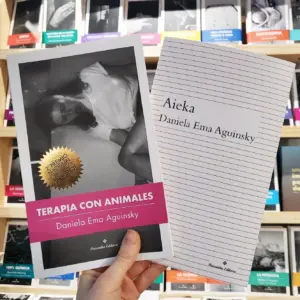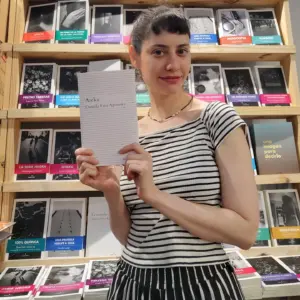i.
La foto de mi abuela el día de su casamiento
Sé que no lo deseabas
pero lo hiciste.
El buen chico judío asignado
no resultó
tan buen chico.
Pasé tu edad
no me casé con el mío.
Lo deje ir lejos
una noche de luna
en la terraza
tomó mi mano y dijo
no me gustan las chicas
con las uñas pintadas.
Las mías
eran rojas
y dejaban marcas
en las paredes de su intestino.
A veces recuerdo al goy
de la fábrica de máquinas de coser
gritaba tu nombre
en la cueva privada de su boca.
Alegre
soprano de interiores
fósforo
en una caja húmeda
durante un corte de luz
vos empezás a irte
yo recién estoy llegando.
i.
The photo of my grandmother on her wedding day
I know you didn't want to
but you still did.
The assigned good Jewish boy
did not turn out to be
such a good boy.
I am past your age
I didn't marry mine.
I let him get away
a moonlit night
on the terrace
he took my hand and said
I don't like girls
with painted nails.
Mine
were red
and left marks
on the walls of his intestine.
Sometimes I remember the goi*
from the sewing machine factory
he screamed your name
in the private cave of his mouth.
Cheerful
indoor soprano
a match
in a wet match box
when there is a fuse
you begin to depart
I'm just arriving.
* Goi (non Jewish boy)
ii.
Palimpsesto
Me tiré ácido
me raspé la piel
y me escribí encima.
Abajo quedaron huellas
los textos que no llegaron
al canon de mi existencia.
Que vengan los cabalistas
los estudiantes de Talmud
voy a desplegarme sobre la mesa,
una escritura sagrada.
Desnúdenme con cuidado
rastreen los indicios
discutan el estado original
de esta mujer borrada.
ii.
Palimpsest
I threw acid on myself
scraped my skin
and wrote on it.
Traces were left below
the texts that did not make it
to the canon of my existence.
Let the Cabalists come
students of the Talmud
I'm going to spread myself on a table,
a sacred script
Undress me with care
track the signs
discuss the original state
of this erased woman.
iii.
Las copas están hechas para romperse
Lo sé
desde que mi abuela guardaba la vajilla
de su abuela, en un aparador especial
que nunca se abría
por lo delicadas que eran
esas copitas verdes de tallos finos como lirios
capacidad mínima, brillantes.
Nada ameritaba
perturbarlas
de su estado decorativo
los nietos no le habíamos dado
una jupá, un compromiso, un nacimiento.
No le habíamos dado nada.
Pero mi abuela sabía mejor que nadie
que las copas
están hechas
para romperse:
van a quebrarse
mientras lavás los platos
o estallar contra el piso cuando levantás la mesa
un día que estás sobrepasada
o se le van a caer a tu nieta, dentro de veinte años,
cuando se mude sola a su primer departamento.
Van a resistir
como las personas viejas resisten
hasta quebrarse
un día cualquiera de sol.
iii.
GLASSWARE ARE MADE TO BE BROKEN
I know
since my grandmother put away the crockery
of her grandmother, in a special sideboard
she never opened
because of how delicate they were
those little green glasses with thin stems like lilies
bright in miniature capacity
Nothing was worth
disturbing them
from their ornamental state
grandchildren hadn´t give her
a chuppah*, an engagement, a birth.
We hadn't given her anything.
But my grandmother knew better than anyone
that glassware
are made to be broken
they are going to break
while you wash the dishes
or explode on the floor when you ´re clearing the table
stressed out
or your granddaughter will drop them in twenty years´ time
when she moves into her first apartment alone.
They will resist
as old people resist
until breaking
any sunny day.
* chuppah: a Jewish wedding
iv.
Cuando venga el Mesías van a curarse todos los enfermos
pero el tonto va a seguir siendo tonto.
Refrán Idish
Cuando venga el Mesías
y reconstruyan el Tercer Templo
no quiero estar arriba
mirando a los hombres rezar
en círculos que cantan y bailan
mientras mujeres charlan
y chicos gritan.
Cuando venga el Mesías
no quiero estar arriba
con el humo de los sacrificios
abajo los sacerdotes entran
y salen como amantes
pronunciando
el nombre sagrado.
Cuando venga el Mesías
y todos retornemos a la tierra
quiero estar en la tierra de este mundo.
iv.
When the Messiah comes, all the sick will be cured.
but the fool will remain a fool.
Yiddish saying
When the Messiah comes
and they rebuild the Third Temple
I don't want to be above
watching men pray
in circles singing and dancing
while women chat
and children shout
When the Messiah comes
I don't want to be above
with the smoke of sacrifices
the priests entering below
and exiting like lovers
pronouncing
the sacred name.
When the Messiah comes
and we all return to earth
I want to be on the earth of this world.
v.
Teléfono fijo
Mis papás me dieron un teléfono fijo
la línea está incluída dijeron
tenelo por las dudas
y quedó en el piso
cuando suena, rara vez
sé que son ellos
(nadie más tiene el número)
me siento en el sillón
espero tres tonos y atiendo
a veces una noticia terrible otras
una invitación para almorzar
lo único fijo este teléfono.
v.
Landline
My parents gave me a landline
the line is paid for they said
keep it just in case
and it stayed on the floor
when it rings, rarely
I know it's them
(no one else has its number)
I sit on the couch
I wait three rings and answer
sometimes terrible news other times
an invitation for lunch
The only fixed thing this phone.
Daniela Ema Aguinsky (Buenos Aires, 1993) is a writer and filmmaker based in Argentina. She Directed the shorts Virtual Guard, Hurricane Berta, 7 Tinder Dates, and several others. She published Amante japonés, Aieka (2023) and Terapia con animales (2022) in Argentina, Mexico and Spain, book that won The National Poetry Prize Storni in 2021. She is also the spanish translator to the California based poet Ellen Bass; Todos los platos del menú (Gog & Magog, 2021). Twitter: laglu Instagram: laglus
Amparo Arróspide (born in Buenos Aires) is an M.Phil. by the University of Salford. As well as poems, short stories and articles on literature and films in anthologies and international magazines, she has published five poetry collections: Presencia en el Misterio, Mosaicos bajo la hiedra, Alucinación en dos actos y algunos poemas, Pañuelos de usar y tirar and En el oído del viento. The latter is part of a trilogy together with Jacuzzi and Hormigas en diaspora, which are in the course of being published. In 2010 she acted as a co-editor of webzine Poetry Life Times, where many of her translations of Spanish poems have appeared, she has translated authors such as Margaret Atwood, Stevie Smith and James Stephens into Spanish, and others such as Guadalupe Grande, Ángel Minaya, Francisca Aguirre, Carmen Crespo, Javier Díaz Gil into English. She takes part in poetry festivals, recently Centro de Poesía José Hierro (Getafe).
Robin Ouzman Hislop is Editor of Poetry Life and Times ; at Artvilla.com
You may visit Aquillrelle.com/Author Robin Ouzman Hislop about author. See Robin performing his work Performance (University of Leeds)


